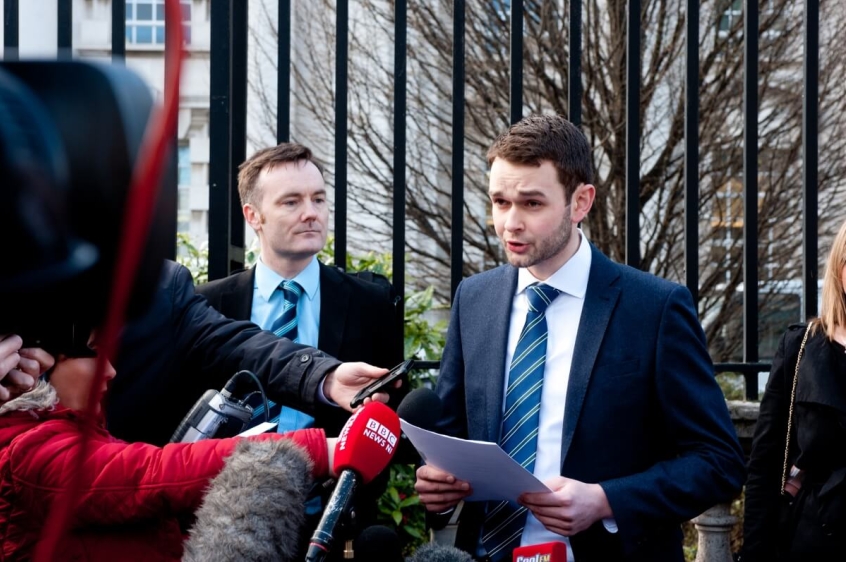
So Ashers Baking Company has lost its appeal.
There were no dissenting judges at Belfast's Court of Appeal as it upheld District Judge Brownlie's ruling from May last year, though the court criticised Northern Ireland's Equality Commission, which brought the case, saying it should have offered advice first.
To recap: Gareth Lee, a gay man associated with the campaigning organisation QueerSpace, ordered a cake from Christian baking company Ashers with the slogan "Support Gay Marriage" and a picture of Sesame Street puppets Bert and Ernie. Ashers originally accepted the order, but Karen McArthur, the manager, subsequently telephoned him to say they couldn't do it after all because they were a "Christian business".
She explained later: "Having taken the order, I immediately felt guilty about it. I knew that using our skills and creativity to produce a cake supporting gay marriage – which we consider to be contrary to God's word – was something which would be on my conscience. If we provided the cake in these terms, I would feel that I was betraying my faith and failing to live in accordance with what God expects of me."
However, in her original ruling Judge Brownlie didn't agree. She noted that there were "competing rights" under the European Convention on Human Rights – the defendants (Ashers) to manifest their religion without unjustified limitation, and the plaintiff (Lee) not to face discrimination for his sex orientation.
Finding for Lee, she said: "To do otherwise would be to allow a religious belief to dictate what the law is."
She continued: "The defendants are entitled to continue to hold their genuine and deeply held religious beliefs and to manifest them but, in accordance with the law, not to manifest them in the commercial sphere if it is contrary to the rights of others."
Now the appeal court has agreed, and that's troubling.
For the avoidance of doubt, in this particular case I'm with Ashers. It seems to me that to compel someone to create a slogan for a cause they are fundamentally opposed to is profoundly undemocratic. It's certainly authoritarian and verges on totalitarian. If a Corbynite Labour baker had been required by law to make a UKIP cake he could justifiably feel aggrieved.
In this case, Gareth Lee ordered a cake supporting gay marriage, and because he is gay – a protected characteristic in law – Ashers had to bake it. But this is to confuse a protected characteristic with a particular opinion; Lee wasn't refused service because he was gay, but because Ashers didn't agree with his views. And Karen McArthur made this perfectly clear. She also said: "I wish to emphasise that this is in no way related to Mr Lee's sexual orientation. We have many gay customers whom we serve regularly without any difficulty. We also have at least one gay member of staff."
Now, it's easy to spin Northern Ireland's very own Gay Cake case into something that it's not: an all-out assault on the forces of good by the (gay) forces of evil. It's much more complicated than that. And it's very important to say that neither Judge Brownlie nor the judges on the Court of Appeal are part of a Satan-inspired anti-Christian conspiracy, They are highly qualified lawyers, and if the law is an ass it's not their fault but the fault of the politicians who passed it. It doesn't really help for campaigners to cry foul.
But there are a few points still worth making.
First, this case has shown up a weakness in legislation, whereby in the tension – inevitable, acknowledged and usually manageable – between strongly held minority religious beliefs and the norms of wider society, those religious beliefs are not adequately defended. This is troubling.
Second, it signals the extraordinarily fundamentalist nature of a particular view of sexuality. Any dissent from the current view that homosexuality is, at every level and in every expression, entirely acceptable, is punished by the label of "bigot". But the McArthurs aren't bigots, they just disagree. However, this makes any legislative push-back against the law as it stands extremely problematic; why, it would be argued, should the law protect bigots?
Third, and following on from that, conservative Christians need to realise just how bad their image is when it comes to issues around sexuality, and how strongly the tide has set against them. In its summary of the case, the Court of Appeal outlines the context for the appeal by referring to this. Homosexual acts in private were criminalised in Northern Ireland until 1985. Gay people were blackmailed and intimidated. And, it says: "The potential for conflict between the rights of the LGBT community and the religious community has unfortunately long been a feature of public debate in Northern Ireland and the strongest opposition to the decriminalisation of homosexual acts between consenting males came from the religious community."
So there aren't just questions for Northern Ireland's lawmakers about how far they want to be genuinely democratic and hospitable to different views. There are questions for the province's Christians: how can we atone for the mistakes of the past and show genuine grace and lovingkindness to people who have suffered very greatly? The answer to that question is unlikely to be found in the law courts.
Follow Mark Woods on Twitter: @RevMarkWoods













